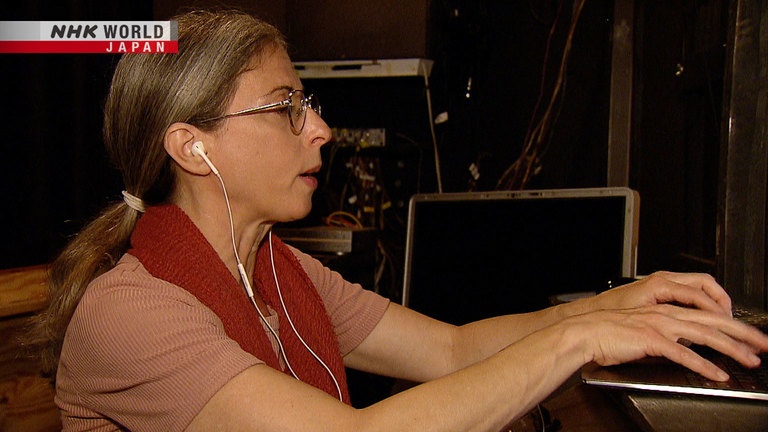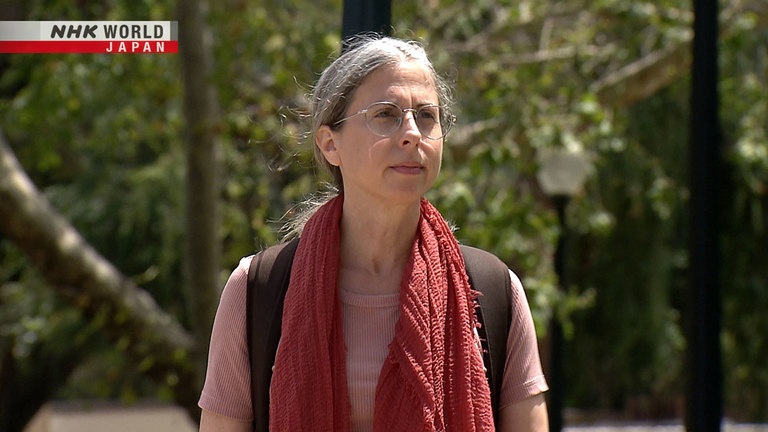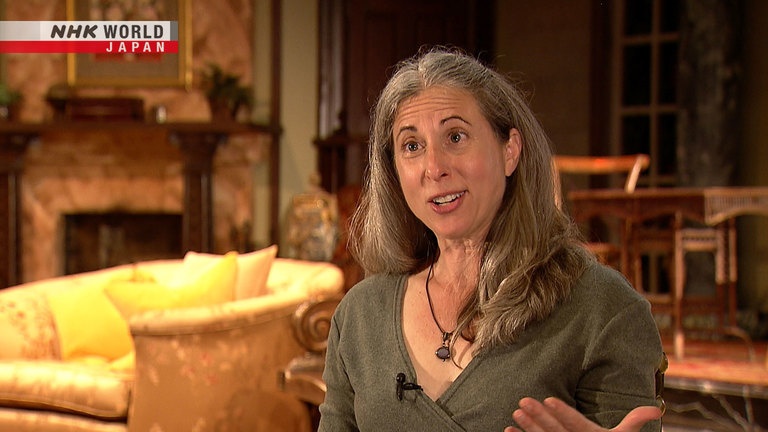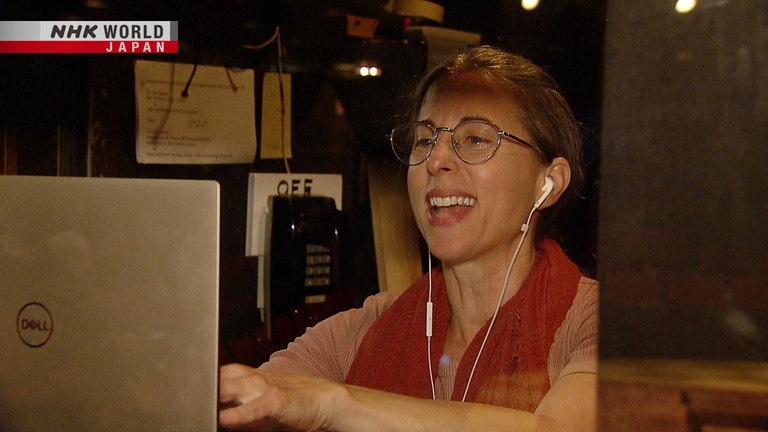The Necessity of an Intimacy Coordinator: Jean Franzblau / Intimacy Coordinator
In the era of #MeToo, intimacy coordinators play an important role in TV, film and theater, ensuring actors feel comfortable performing intimate scenes, while helping directors execute their visions.




Transcript
Direct Talk
In Hollywood, the MeToo movement
and other organizations
continue the fight against
sexual harassment and assault.
In the film and television industry,
sometimes depictions of sex
or violence are required.
Intimacy coordinators,
who ensure actors are comfortable when
participating in scenes with nudity or sex,
have become essential on set.
A profession only created a few years ago,
movie studios and media production companies
now widely adopt the service.
A front runner in the field Jean Franzblau
is one of about 40 active professionals.
The Necessity of an Intimacy Coordinator
We asked Franzblau why
intimacy coordinators are needed
and what role they play.
My role represents a
disruptive shift in entertainment,
and a good one.
One that's been long needed.
It acknowledges the fact
that actor's wellness matters
and that these hyper exposed scenes
deserve to be handled with care.
It is a time of change for the better,
and it's really, it's difficult
to change an industry
this way.
It's very difficult.
But there's something
powerful about being part of it,
being right there when it was happening.
And that is what I get to do.
It starts with exchanging
opinions with all the parties.
The first thing I want you to know is that
our conversation is going to be confidential.
And at the very end of our talk,
we'll go over any points
that feel important for us to revisit.
Franzblau takes notes
during meetings with actors
to relay to production staff.
My work begins with the story.
I read the script
and then I analyze the script
to pick out all the scenes
that I would recommend
that an intimacy coordinator be present.
My job in reading those scenes
is to understand better how,
the context of the scenes
and how they rest in the entire story.
Now, I have a conversation with the director,
or if it's a TV show,
the showrunner, the writer.
So, there might be a team of people
that I have a meeting with.
And I ask them very specific questions.
The script might say, "They make out."
That means something very different
to some people versus others.
Some people would think that's a kiss.
Somebody else thinks that would mean
all kinds of hand motion.
Some people would think that means grinding.
I mean, there's so many things
that that could be.
So it's my job to ask the creative team.
What exactly do you mean?
Do you mean this or do you mean this?
If you want this, how intense
between 1 and 10 would this be?
And some directors are prepared for that
and others aren't really as comfortable
making those decisions ahead of time.
They like to feel for it in the moment.
The problem is like,
think about it for a moment that
if you were directing a stunt.
You wouldn't say to the actor,
when you jump off that cliff,
just sort of feel it out.
The actor needs to know
the techniques for landing safely.
So consider it, I will ask
every actor and every director
and every production
to consider that it's like a knife fight.
You do not play it by ear.
You need to know
what's going to happen specifically.
So everyone stays safe.
I must be there for rehearsal
and I must be there for shooting on set.
At first
it was like, I was a bit of
a burden being present,
but what many directors don't realize is that
we care about the scenes
being real and looking good,
and we have skills to help with that.
And so one time I'm like,
oh, I have an idea for the director.
I wonder if I should say it.
And there was like,
we were in between shots
and like, okay there's a director.
There they come.
And I'm like,
hi, I know we just met today.
But, um, I'm wondering if
such and such, such and such,
he's like,
that's a good idea.
Yes!
And from that point on
like the director and I were tight
because he realized for the first time
that I care about his job,
I'm not an obstacle.
I wanna be a solution,
I wanna help.
And it was fun.
An agreement to include
sexual scenes or nudity
is made in advance between
the actors and a production company.
So why do we need
an intimacy coordinator on set?
There are pressure and power.
The pressure is money and time.
We have a deadline,
we have a show to put up.
A well-meaning director could have a vision,
a creative vision in their mind.
And when they're on set and
they're working with the actors,
they have so many things to think about.
They're thinking about their director
of photography and the lighting.
And they're thinking about the light.
There's so much for a director to consider.
Now we have two actors
who are doing very vulnerable work,
simulated sex,
or kissing.
It's awkward.
Now the director might say,
do it again, do it a third time.
This time do it with tongues, you know,
and I have to, an intimacy coordinator
needs to be present to say,
ah, I need to stop.
We've already discussed.
There will be no
tongue kissing in this scene.
Uh, we've already discussed that.
Now the details of that might be
that one actor said I'm not comfortable.
Another actor might have said,
oh, it's okay. I don't mind.
But if one actor says no,
it's no,
but the director who's thinking about,
so many things
might forget that detail
and just be like, okay, go do it.
And I have to go, oh, just.
It's in my mind.
I have the notes.
Also a director might say,
"Ooh, um, please remove your skirt."
It would be,
"Let's get that shot without a skirt."
Mm, wait a minute. Wait a minute.
According to the document
that has been signed,
there's no below the waist nudity,
that on the set or
in the heat of the moment,
it's easy to forget all of the details of
the boundaries that different people have.
It's my job to keep them all in mind
and to be that voice.
Because when somebody is, let's say nude,
it's extremely vulnerable.
Also if that actor is working
with a famous director,
or if that actor is a day player.
They're just coming on set for one day
and they're working with a
Hollywood multimillion dollar A-list actor
doing one scene.
It's really tough to advocate
for one's boundaries to go,
oh, remember I said, no kissing,
no tongue kissing or whatever.
It's, in the heat of the moment,
they just wanna do a good job
and they don't wanna be considered a problem.
So I come in and make those reminders.
Here's what it is.
Let me remind everybody what it is.
Let's reset.
Let's take a moment to
remember what the boundaries are
and, you know, stuff like that.
So I have to be that voice.
It takes...it's easier for me
than it is for the actor sometimes.
Jean Franzblau was born
and raised in Florida.
She moved to Los Angeles to attend
UCLA to study mass communication
and was an actor and dancer.
She educated herself about sexuality
and began a path to healing after
being sexually assaulted by a boyfriend.
She became interested in the work of
an intimacy coordinator and took a course.
Currently, she is active in
Hollywood blockbuster movies and theater.
Communication was you know,
a particular passion of mine.
Helping people to understand each other,
conflict resolution,
all that kind of stuff.
I also had written and produced in,
you know, some things, right.
So I I'm really interested in and
have a passion for entertainment,
but in my personal life, you know,
I was in a relationship where
I experienced a sexual assault,
the most common kind, which is,
with a partner.
Um... and, and so...
At the time,
as with many people
who experience sexual assault,
we don't actually have the words for it.
I felt very shattered.
Um, I felt like
I would never have a
healthy relationship again.
And I, it was deeply, deeply troubling.
I really felt like I was probably broken.
And so, I did a lot
to help myself to grow
from therapy to all the different ways
in which people, build up and
strengthen self again after injury.
And so I care very deeply about consent.
I care deeply that
my boundaries are honored.
And frankly, I think that sometimes
when we have our own violation,
then we become bulldogs
and we want to make sure that
other people are protected too.
So I care very much.
It's still really important to me,
these topics of consent,
of respect, of honoring.
Franzblau believes in the value of consent.
How does she help actors with their work?
One time I was working with an actor.
And the question was,
are you comfortable with a scene where
you're touched here, then here,
then here, then here.
and then kissing the whole time.
And the actor said,
"That's a lot. I think I'll know on the day."
And I thought about it.
So the person said, no,
they didn't say no.
They said
"That's a lot."
"I think I'll know on the day."
That is a postponement of an answer.
And what a good communicator knows
is that saying no.
And I think this is a cultural thing
that many different cultures understand,
is that saying no is not acceptable,
but saying, um, I'll think about it.
Is a way of saying no.
So I just assumed that it was "no."
and but I found out what, where,
like I said, how about, may I ask you?
A couple more details?
And I found, I noticed
they leaned forward,
that they seem more enthusiastic
about other aspects of the scene.
So I could go to the director and say,
I believe we have a strong "yes"
for this and this.
And a "no" for this, for this,
like sequence you were hoping for.
And the director's like,
hmm, okay.
I think I know a way to shoot that.
And we decided to shoot where,
there was no shot longer than 10 seconds.
And so the director and I
were at the monitor,
which was just an iPad and
I had my phone and a stopwatch.
And the director says action.
And I go, oop,
and then, after 10 seconds,
I tap that the director on the shoulder
and the director says cut.
And as a team,
we are coordinating our efforts
to get the art made,
to get the scene shot,
with an actor who feels
totally at ease and respected.
It was so cool.
And that's how we do it.
The audience will have no idea
of all those, behind the scenes things,
but the actor might look at that film
in the future and go,
I remember feeling safe that day.
Kissing scenes are
often important to a storyline.
Franzblau approaches a kissing scene
like dance choreography.
I actually created a
kiss workshop with the help.
I've had classes on how to do such a thing
and I, you know, added my own version of it,
but I created a workshop
to help actors to talk about kissing.
And this is part of our job
is like how long is the kiss between 1 and 10?
How is intense as the kiss,
is it a romantic kiss
or like a passionate kiss,
open mouth, closed mouth,
tongue no tongue,
like all those details, choreographed.
Head tilted to the left,
tilted to the right.
Right. So many details.
So when one can look at the character
and how that character
would kiss a first kiss
or how that character would see,
a body for the first time.
This could be really a wonderful moment for
the character through the intimate scene.
And, and that's something that
often we as intimacy coordinators
have opinions about,
how to make it richer.
I once worked with an actor
where we were talking about kissing
and I said, the approach that
we're gonna take is, as if it's a dance.
And they were like,
oh, okay, I'm a dancer. I can do that.
And it just made them feel
so much more calm.
We asked Franzblau to write something
that holds meaning for her.
She wrote
"Sometimes the most courageous thing
we can do is tell the truth."
The culture trains us to
hide the truth a lot of the time.
So that we don't make waves.
And yet,
telling the truth, being honest,
can be the most important thing
for relationships.
I would feel more relaxed in the world
if I could tell the truth more often.
I appreciate it when
people can tell me the truth.
About telling the truth
with respect and kindness
but that would be my preference.
But yeah, truth telling.
Sometimes the most courageous thing
we can do is tell the truth.